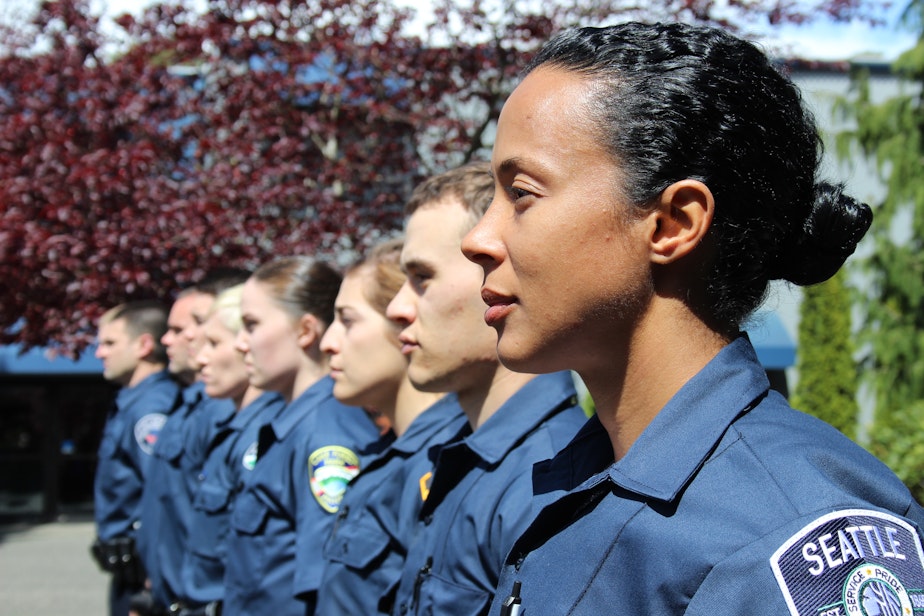'Don’t just stand there:' New law removes 'malice' condition for cops

There are still a lot of things Marilyn Covarrubias doesn’t understand about why her son Daniel died in an encounter with Lakewood police officers in 2015. Like why the officers mistook his cell phone for a gun. Why they didn’t call for medical help sooner after the shooting. And why they were so quick to open fire.
“They need to learn how to ascertain what is actually happening," Covarrubias said. "Before they go into kill mode.”
Covarrubias campaigned for Initiative 940, sponsored by the group De-Escalate Washington. And she said she’s happy with the compromise bill that won the support of some law enforcement groups.
The bill, which passed on the final day of the legislative session, requires new training for law enforcement officers and makes it easier to prosecute officers for negligent shootings. It also mandates independent investigations of shootings by police.
“I want something good to come out of this,” Covarrubias said. “I want to stop seeing people die. Because every time I see people die unnecessarily — needlessly — it brings all of the pain back.”
Sponsored
The Seattle Police Officers Guild called Initiative 940 “anti-cop" and raised concerns that it would make it easier to prosecute police for political reasons.
But Sue Rahr, executive director of the state’s Criminal Justice Training Commission, said the public and law enforcement actually had many goals in common.
“As the initiative was gaining momentum, there was certainly a perception about it being very anti-cop,” Rahr said. “Because a lot of the people who supported I-940 — there were people who said some pretty inflammatory things. But at the end of the day, many of the people in that group I worked with and [law enforcement] had the same goal, and that is to reduce deadly encounters.”
The new law changes the threshold for prosecuting officers for negligent deaths. Critics said the old standard, which required a showing of “malice” by the officer, made prosecution nearly impossible. Now the standard will be whether the officer acted as any “reasonable” officer would have.
Rahr says that’s already the standard used in police training.
Sponsored
“I personally am glad that the word ‘malice’ was removed, because I think removing that word does a lot to reassure the public," she said. "And we’re starting to rebuild the trust of people that were concerned about having that malice standard there.”
The law also emphasizes the need for police officers to provide first aid to shooting victims as soon as the scene is secure.
“I think the big point that I-940 was trying to make in that section was, when somebody needs help don’t just stand there,” said James McMahan, policy director for WA Association of Sheriffs and Police Chiefs. “And I have every confidence that in the vast majority of cases where this would be applicable law, our officers don’t just stand there. They provide help to those who need help.”
Law enforcement groups didn't support Initiative 940 as proposed by De-Escalate Washington, but many did support the final compromise. McMahan said the negotiations resulted in real dialogue.
“We started something new where both sides of an emotional and polarizing issue began to truly listen to each other," he said. "And we want to build on that."
Sponsored
Rahr said there's a two-year window to implement new training procedures, but she hopes to get them up and running sooner. Her police academy already trains new police recruits in concepts like de-escalating violent confrontations. Under the new law, that training will extend to officers already on the job across the state.
“That part of the legislation is very good news,” she said. “This is important training. Now we have funding and capacity to actually do that training.”
Rahr is also responsible for assembling stakeholders to weigh in on the new law — and for figuring out how to conduct independent investigations when someone dies at the hands of law enforcement.
“That’s going to be an area where we’re going to have to do a lot of groundwork and create something that doesn’t currently exist,” she said, adding that the interagency team used in Snohomish County is one well-regarded model.
Another unknown to consider: a lawsuit from professional initiative sponsor Tim Eyman. The lawsuit states that voters should have final say on the new law, and Eyman is asking a judge to put the initiative and the compromise language on the November ballot.
Sponsored
Rahr said Eyman’s lawsuit has not affected plans to implement the law so far. However, a hearing in the case has been scheduled for April 20 in Thurston County.

